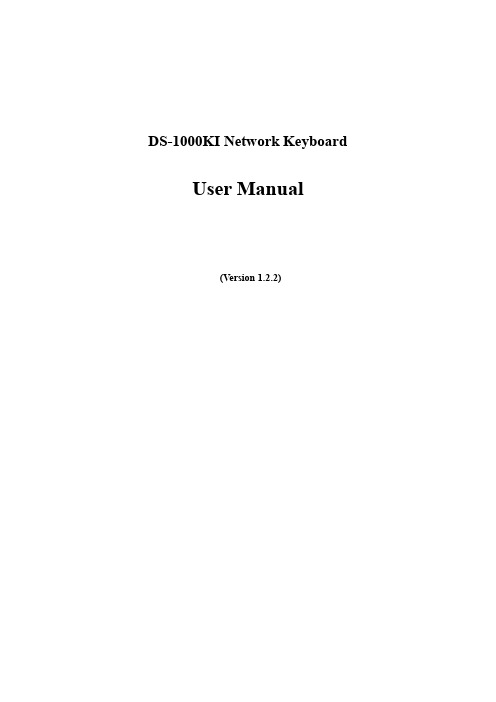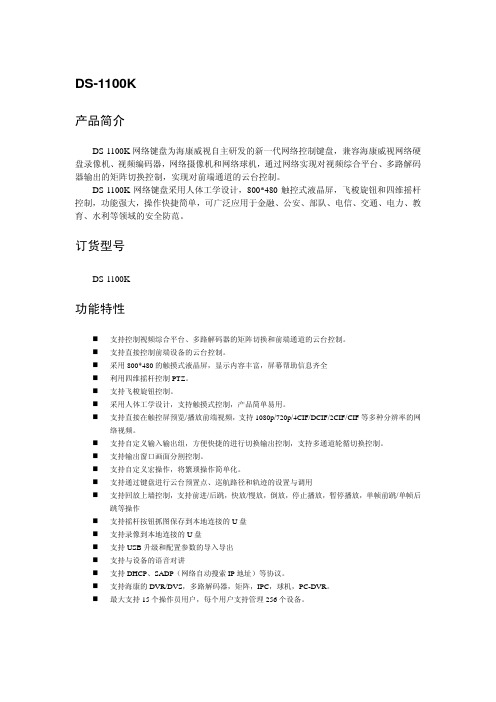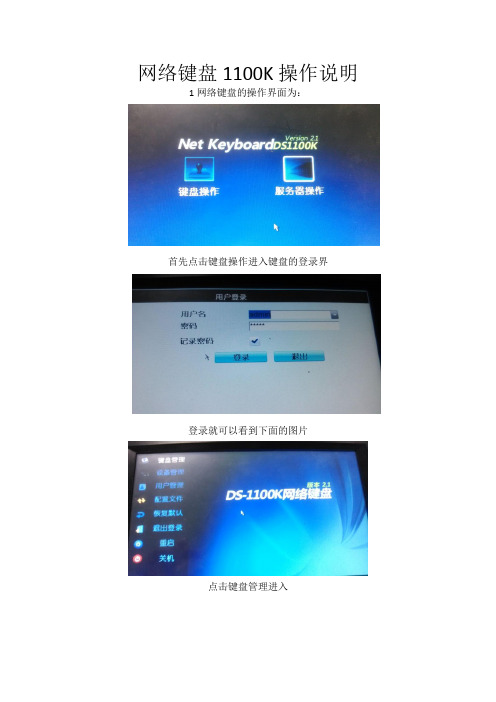DS-1000K网络键盘说明书_v1[1].1
海康DS K网络控制键盘说明书

工作温度 工作湿度
尺寸 重量
网络方式
DS‐1100K
7 英寸 TFT LCD 触控屏 800*480 显示分辨率
四维摇杆
1 个,3.5mm 立体声(电平:2.0Vp‐p,阻抗:1kΩ)
1 个,3.5mm 立体声(线性电平,阻抗:600Ω)
1 个,RJ45 100M/1000M 自适应以太网口 1 个,标准 RS‐232 串行接口 1 个,标准 RS‐485 串行接口 1 个,USB 2.0
DC12V
≤15W
‐10℃‐‐+55℃
10%‐‐90%
435mm(长)*193mm(宽)*110(高)
2KG
正面图
物理接口
区域 ① ③ 接口 网口 USB 口 电源开关
区域 ② ④ ⑥ ⑧ ⑩
说明 接地端 音频输出 预留接口 RS‐232 串口 电源输入 抓图按钮
技术参数
型号 控制方式 TFT LCD 面板 操纵杆 语音对讲输入 音频输出 网络接口 串行接口
USB 接口 电源 功耗
订货型号
DS-1100K
功能特性
支持控制视频综合平台、多路解码器的矩阵切换和前端通道的云台控制。 支持直接控制前端设备的云台控制。 采用 800*480 的触摸式液晶屏,显示内容丰富,屏幕帮助信息齐全 利用四维摇杆控制 PTZ。 支持飞梭旋钮控制。 采用人体工学设计,支持触摸式控制,产品简单易用。 支持直接在触控屏预览/播放前端视频,支持 1080p/720p/4CIF/DCIF/2CIF/CIF 等多种分辨率的网
KB控制键盘使用手册-V301

智能控制键盘使用手册中文版 V3.01在使用智能控制键盘之前,敬请您仔细阅读本使用手册目录欢迎 0第一章注意事项 (1)第二章安装指南 (2)2.1设备配置清单 (2)2.2安装准备 (2)2.3安装说明 (2)2.4E2、E3英文键盘前面板说明 (3)2.5C2、C3中文键盘前面板说明 (6)2.6摇杆操作说明 (8)2.7控制DVR操作指南 (9)第三章典型接线示意图 (10)3.1接云台 (10)3.2接DVR (10)第四章技术参数 (11)附录:快速设置协议&波特率指南 (11)欢迎感谢您购买智能控制键盘。
本手册旨在供您作为操作和编程系统时的参考工具。
您可以在本手册中找到有关功能和命令的信息,以及详细的快速操作指南。
在安装和使用系统之前,请充分了解本手册中的信息。
本手册的内容将做不定期的更新,对于本产品功能上的提升,我们会在新的版本中加入,恕不另行通知;更新的内容将会在本手册的新版本中加入。
我们随时会改进或更新本手册中描述的产品或程序。
第一章注意事项本使用手册是智能控制键盘用户的基本说明书。
本使用手册由重要安全和警告信息、智能控制键盘产品的功能说明、性能特点及参数、安装步骤等使用智能控制键盘时必须了解的内容组成。
首次使用智能控制键盘者及以前使用过类似产品者在使用本产品前最好先阅读一遍本使用手册。
如可能,请最好从第1页开始按顺序阅读。
如用户希望只看需要的部分,也可参考目录加以选择。
★小心运输运输及保管过程中要防止重压、剧烈振动和浸泡等对产品造成的损坏。
本产品必须采用分体包装形式运输,无论工程商发货或返回工厂维修,若因采用装配后的整体运输方式而造成的任何产品损坏,不属保修范围。
★小心安装对键盘要轻拿轻放,勿用力挤压各结构部件、防止重压、剧烈震动等不正确的操作方法,否则可能引起机械故障,影响键盘的整体性能。
安装时必须遵守各项电气安全标准,配用本机自带的专用电源适配器。
控制信号在传输过程中应与高压设备或电缆保持足够的距离,必要时还要做好防雷击、防浪涌等防护措施。
DS-1100K操作手册v1.1

第 2 章. 操作必读........................................................................................................................ 8
2.1
用户说明.................................................................................................................... 8
3.1.7 重启.................................................................................................................. 22
3.1.8 关机.................................................................................................................. 22
3.1.1.4 时间设置.................................................................................................. 15
3.1.1.5 语言设置.................................................................................................. 16
3.1.3.3 修改用户密码和删除用户 ...................................................................... 21
键盘1000手册

键盘1000系列V1.0.0前言概述本文档主要介绍键盘外观、菜单配置以及与控制设备连接的使用方法。
适用型号:NKB1000、KB1000和KBD1000,其中NKB1000为网络键盘、KB1000为球机键盘、KBD1000为模拟键盘。
符号约定在本文中可能出现下列标志,它们所代表的含义如下:符号说明表示有高度潜在危险,如果不能避免,会导致人员伤亡或严重伤害。
表示有中度或低度潜在危险,如果不能避免,可能导致人员轻微或中等伤害。
表示有潜在风险,如果忽视这些文本,可能导致设备损坏、数据丢失、设备性能降低或不可预知的结果。
表示静电敏感的设备。
防静电表示高压危险。
电击防护表示强激光辐射。
激光辐射表示能帮助您解决某个问题或节省您的时间。
表示是正文的附加信息,是对正文的强调和补充。
重要安全须知下面是关于产品的正确使用方法、为预防危险、防止财产受到损失等内容,使用设备前请仔细阅读本说明书并在使用时严格遵守,阅读后请妥善保存说明书。
●请在设备布控后及时修改用户的默认密码,以免被人盗用。
●请勿将设备放置和安装在阳光直射的地方或发热设备附近。
●请勿将设备安装在潮湿、有灰尘或煤烟的场所。
●请保持设备的水平安装,或将设备安装在稳定场所,注意防止本产品坠落。
●请勿将液体滴到或溅到设备上,并确保设备上没有放置装满液体的物品,防止液体流入设备。
●请将设备安装在通风良好的场所,切勿堵塞设备的通风口。
●仅可在额定输入输出范围内使用设备。
●请勿随意拆卸设备。
●请在允许的湿度和温度范围内运输、使用和存储设备。
●请务必按照要求使用电池,否则可能导致电池起火、爆炸或燃烧的危险!●更换电池时只能使用同样类型的电池。
●产品必须使用本地区推荐使用的电线组件(电源线),并在其额定规格内使用。
●请务必使用设备标配的电源适配器,否则引起的人员伤害或设备损害由使用方自己承担。
●请使用满足SELV(安全超低电压)要求的电源,并按照IEC60950-1符合Limited Power Source(受限制电源)的额定电压供电,具体供电要求以设备标签为准。
DS-1000KI Network Keyboard User Manual V1.2.2

DS-1000KI Network Keyboard User Manual(Version 1.2.2)Thanks a lot for purchasing our product. If there is any question, please feel free to contact us.This manual may have something inaccurate in technology, unsuited with the product’s functions and operations or the misprints. The manual’s contents will be changed with the enhanced functions of the product, as well as give the regular advance or renew the product and procedure in this manual. The renewed contents will be added in the new edition of this manual and no separate notice will be given.IndexChapter1Features of DS-1000KI (3)1.1Main Features (3)1.2Sketch of DS-1000KI (5)1.3Rear Board Description (7)1.4Keyboard Connection (8)Chapter2Keyboard Operation (9)2.1Enter into keyboard system (9)2.2Keyboard Configuration (11)2.2.1System Configuration (11)2.2.2User Configuration (14)2.2.3Defense Configuration (20)2.3Control DVR (22)2.3.1Login DVR (22)2.3.2DVR Configuration (24)2.3.2Video playback (25)2.3.3Manual Video Recording (27)2.3.4PTZ control (28)2.3.5Preview (30)2.3.6Alarm handling (31)2.4Other Information (33)2.4.1Keyboard lock (33)2.5Upgrade Keyboard Firmware (34)2.5.1FTP Server Setup (34)2.5.2Upgrade Firmware (37)Appendix A: Specification (38)Appendix B: Troubleshooting (39)Appendix C: Notes (40)Chapter1 Features of DS-1000KI1.1 Main Features●Support DVR cascade. One DS-1000KI keyboard can maximum control 99DVR units via network. If you use RS485 bus mode, one keyboard can maximum control 32 DVR units.●DS-1000KI Keyboard has two liquid crystal screens with the left one showingthe controlling and configuring menu respectively. Press the key 【Menu】for less than 2 seconds and enter into the controlling menu, while press【Menu】for more than 2 seconds and enter into the keyboard configuring menu. The right one shows the information including the user information, the present login state, alarm information etc.●DS-1000KI has two communication modes: Network mode and RS485 busmode. You can use either of them to control DVR.●DS-1000KI keyboard users are divided into administrator and operator.Administrator can operate both the controlling and configuring menu while the operator can only operate the controlling menu.●DS-1000KI has the function to lock keyboard. Presskey to lock the●DS-1000KI controlling menu can carry out DVR configuration, video playback,manual record, PTZ control, DVR local preview and other functions. Both the administrator and operator can control them.●DS-1000KI configuring menu can set up keyboard IP address, user ID number,keyboard communication mode, keyboard password management etc. This part is only controlled by the administrator.●DS-1000KI can control the different DVR units. Before operating DVR, enterthe configuring menu, in the “SysCfg” menu, select the keyboard control mode (either network mode or RS485 bus mode). In the “UserCfg” menu, create one new user, input the user ID, then input the information of the DVR including DVR user name, password, DEV ID, DVR IP etc. After setting up the user information, press the key【ID】and input the correct user ID, you can login and operate the corresponding DVR.●DS-1000KI network keyboard is equipped with the joystick. Y ou can use it tocontrol PTZ easily.●DS-1000KI network keyboard could receive the alarm information of DVR.Before being permitted, it should set up to receive the alarm. In the alarm configuration of the keyboard configuring menu, set up the information on permitting to receive the alarm. Then, by choosing the alarm handling in the keyboard controlling menu: set “Arm” to receive the alarm; set “Disarm” not to receive the alarm. Meanwhile, the keyboard can receive the alarm informationof 10 DVR at most.DS-1000KI network keyboard has four alarm outputs and can set up or clear the alarm output by operating the alarm handling in the controlling menu.Note: If you use DS-1000KI network keyboard to control DS-8000 series DVR, the firmware of DVR must be version1.4 above.1.2Sketch of DS-1000KIFig 1.1.11------ Menu area: Show the keyboard menu;2------【Menu 】: Menu key. Press it more than 2 seconds, the menu area will display the keyboard menu, otherwise the menu area will display the controlling menu;3------ Information Display area: Display the input information, communication mode, DVR information, alarm information, etc.4------【ID 】: The user code name. Use it to select DVR to control.5------【Zoom 】: Zoom function in PTZ control mode.6------【Focus 】: Focus function in PTZ control mode.7------【Iris 】: Iris function in PTZ control mode.8------ Joystick: Control Pan/Tilt in PTZ control mode.9------【】: The key to choose the left keyboard menu.10-----】: The key to choose the right keyboard menu.11----【Cam 】: Camera ID number (Corresponding the DVR channel number).12----【0】~【9】: Number and character keys.13----【Enter 】: Confirmation key.14----【Mon 】: Monitor ID key (Reserved).15---- Lamps: Ready ,Status ,Link ,Tx/Rx ,Com ,Alarm ,Power .16----【Del 】: Delete key.17----【*】: Input key to choose uppercase character, lowercase character or number.18----【Shot】: The key to adjust the PTZ preset.19----【Freeze】: Reserved.20----【▲】: Page Up key in the information display area. When you input IP address, you can use it as delete key.21----【▼】: Page Down key in the information area. When you input IP address, you can use it as space key.22----: Keyboard lock key.Fig 1.2.11------ Dial Switches. The factory default values are “on on off off off off off off (11000000)”.From the picture we can see the dial switch consists of 8 sub-switches. Now the function of each sub-switch is following:Switch 1: When in “on”, PORT A full-duplex 485 is changed into half-duplex 485. It must be used together with Switch 2.Switch 2: When in “on”, PORT A full-duplex 485 is changed into half-duplex 485. It must be uses together with Switch 1.Switch 3: When in “on”, PORT A R+, R- add the matching resistance of 120Ω.Switch 4: When in “on”, PORT A T+, T- add the matching resistance of 120Ω.Switch 5: When in “on”, PORT B D+, D- add the matching resistance of 120ΩSwitch 6: “off”. Reserved.Switch 7: “off”. Reserved.Switch 8: “off”. Reserved.2------ RS485 BUS PORT A ( full-duplex mode SW = 00000000, half-duplex mode SW = 11000000), connecting with KEYBOARD port of DVR.3------ RS485 BUS PORT B.4------ RS232 Interface (RJ45).5------ Network Interface (RJ45).6------ Alarm output interface.4 kinds of switches (dry nodes) will output the alarm information. With A and B as a group,they will turn off when there is an alarm. Otherwise, they will turn on.7------ 5V DC Socket.1.4.1 Network connectionIf you use keyboard network work mode, just use one network cable to connect keyboard UTP port with network switch or hub. In keyboard “SysCfg” menu, setup one IP address for the keyboard and select “Net” mode. Please refer to chapter2.2 for detail configuration.1.4.2 RS-485 connectionIf you use keyboard RS-485 bus work bus. On the keyboard rear panel, Port A has R+, R- pins. On DVR rear panel, there are two RJ45 keyboard interface. You can select one to connect keyboard, and the other one for DVR cascade. The DVR RJ45 pin definition is following:DVR keyboard RJ45 interfacePin definitionTo make the connect cable according the follows. As to left point of RJ45 head, 1st and 2nd cables are the anode and cathode line for sending, 3rd and 4th cables are the anode and cathode line for receiving, 7 is the shared grounding line:You can connect DS-1000KI Port A R+ R- pins with DVR keyboard interface Pin3 and Pin4, shown as following:DVR KBIn keyboard “SysCfg” menu, select “Bus” control mode.Chapter2 Keyboard Operation2.1 Enter into keyboard systemWhen DS-1000KI network keyboard is in power, the menu screen will show the following information:Fig 2.1.1When “Password”appears on the information screen, input the password (The default administrator password of DS-1000KI keyboard is 111 and the common password is 222) and enter into the system operation by pressing the key【Enter】, as shown following:Fig 2.1.2Note: DS-1000KI keyboard can control DVR by either network mode or RS485 bus mode. Here we just describe the usage of network mode. It is the same for RS485 bus mode.2.2 Keyboard ConfigurationBefore controlling DVR, you should first configure DS-1000KI net keyboard including system configuration, user configuration and defense configuration. Press the key【Menu】for more than 2 seconds, you will enter into the keyboard configuration (the administrator password is needed to login), as shown in Fig 2.1.1Fig 2.2.1 Keyboard Configuration2.2.1 System ConfigurationAfter entering into the configuration interface, we could see three corresponding menu items named “SysCfg”(Keyboard System Configuration), “UserCfg”(User Configuration) and “ArmCfg”(Defense Configuration) on the menu screen. Press “SysCfg”and enter into the system configuration interface, as shown in Fig 2.2.2. In this configuration menu, you can setup all detail keyboard parameters such as Keyboard IP, Keyboard ID, port number, super password, operator password and controlling modes. Each parameter setting is shown below:Fig 2.2.2 Keyboard System Configuration⏹Prev.: Previous menu.⏹IP Addr: IP address of DS-1000KI network keyboard. Press【1】to modify itwhile press【2】to confirm it as shown in Fig 2.2.3-1.⏹KBD ID: Keyboard number. Input the keyboard number with the numeral keysand press【Enter】to confirm it as shown in Fig 2.2.3-2⏹MaskIP: The sub net IP of DS-1000KI network keyboard. The default factoryvalue is 255.255.255.0. Press【2】to confirm it. Press【1】to modify it and press 【Enter】to confirm the new mask IP as shown in Fig 2.2.3-3⏹Port: The network port. Default factory value is 8000. Press【2】to confirm it.Press【1】to modify it and press【Enter】to confirm the new port number as shown in Fig 2.2.3-4.⏹Gateway: The gateway IP address of the keyboard.⏹SupPwd: The password of the administrator. The default factory value is 111.Input the new password with the numeral keys and press【Enter】to confirm it as shown in Fig 2.2.3-5 and Fig 2.2.3-6.⏹Password: The password of the operator. The default factory value is 222. Thesetup usage is the same as the super password.⏹CtrlMod: You can select either RS485 BUS mode or network mode to controlDVR. Press【1】to choose the bus mode and press【2】to choose the net mode as shown in Fig.2.2.3-7.⏹Reboot: Reboot keyboard.⏹Upgrade: You can upgrade the firmware of DS-1000KI keyboard via network.In the upgrade menu, input the FTP server IP. Then keyboard will connect with the FTP server and download the firmware via network. Please refer to FTP server user manual.Fig 2.2.3 Parameter Settings2.2.2 User ConfigurationIn the “User Configuration” menu, you can setup many users. Each user can only control one DVR. After you create the relationship between the user and DVR, you can input the username to login the corresponding DVR and control DVR using the keyboard. In the “User Configuration” menu, you can add, delete, modify and query the users and related DVRs.Fig 2.2.4 User ConfigurationNew UserFor example, if you want to control DVR with IP address of 192.0.1.99 by DS-1000KI network keyboard. First, you should create one new user. Choose “New”item in the user configuration menu, you will enter into new user input menu as shown in Fig 2.2.5. You can input the new user name. Press【*】to shift the input method as shown in Fig 2.2.5.Fig 2.2.5 Input Methods of DS-1000KIFor example, here I input “01” as the user name and press【Enter】to confirm it as shown in Fig 2.2.6-1.Fig 2.2.6Then, choose the device type (“1.DVR”as shown in Fig 2.2.6-2), press【1】tochoose “DVR” and input the user name, password of the DVR. The keyboard must use this username and password to login the DVR. For example, the default user name of DVR 192.0.1.99 is “admin” and the default password of the DVR is “12345”. Here we also input the same username and password as shown in Fig 2.2.6-3, 2.2.6-4.For Dev ID and Dev Port as shown in Fig 2.2.6-5, Fig 2.2.6-7, you must input the same Dev ID and port number as DVR has. In the “Display”menu of DVR, you can find out the Dev ID. The default ID of DVR is “88”. Here we input “01” because the Dev ID of DVR (192.0.1.99) is 01.Note: If you use RS485 Bus control mode, please make sure that each DVR has different Dev ID so that the user can login the corresponding DVR.Finally, input DVR IP address of “192.0.1.99”, then save the configuration. You can create other new users with the above steps.ModifyIn case of revising some users, here we use the above example to explain the operation. We know that the user of “01” can control DVR with “192.0.1.99” IP address. Now, we will change it into controlling DVR with “192.0.1.9” IP address. The detailed operation is following:1. Input user name:In the user configuration menu as shown in Fig2.2.4, choose the “Modify” menu item. In the information display area screen, input the user name of “01” and press【Enter】to confirm it as shown in Fig 2.2.7.Fig 2.2.7 Input User Name2. Modify Device Type: In the information display screen as shown in Fig 2.2.8, we could see the original configuration of user “01” is DVR. If the new configuration is also DVR, press【2】; If you want to change into other device type, press【1】to choose new device type (At present, only DVR device type can be selected).Fig 2.2.8 Change device type3. Modify Device Username: Modify device username according to the indication.If there is no need to revise, press【2】to confirm it and enter the next operation as shown in Fig 2.2.9.Fig 2.2.9 Modify Device UsernameSee Fig 2.2.10.4. Modify Device Password:See Fig 2.2.11.5. Modify Device ID:See Fig 2.2.126. Modify Device IP address:7. Modify Device Port: See Fig 2.2.13.Fig 2.2.13 Modify Device Port8. Save modification: Press 【1】to save the revise of user “01” as shown in Fig 2.2.14.Fig 2.2.14 Save Revised Configuration●Delete UserInput the user name to be deleted according to the indication, press【Enter】to confirm it, press【1】to delete or press【2】to exit. In the network control mode, Device IP address is displayed. In RS485 bus mode, device ID is displayed as shown in Fig 2.2.15.Fig 2.2.15 Delete User●QueryChoose “Query” item to show the user information, press【▲】to show the previous information and press【▼】to show the next information. In network mode, device IP is display. In RS485 bus mode, device ID is displayed, as shown in Fig 2.2.16. In the case of no user configuration in the keyboard, press “Query” item and system will give thesuggestion of “Not Existing User”.Fig 2.2.16 Query User InformationDelete allIf we need to delete all the users, press “DelAll” item and press【1】to confirm it so that all the built users will be deleted. Press【2】to exit and return to the previous menu. It’s interface is shown in Fig 2.2.17.2.2.3 Defense ConfigurationChoose “ArmCfg” item, if there is no defense setting, the information display area will be shown as Fig 2.2.18-1. Press【1】to defense or press【2】to exit and enter into the next user. If there is defense setting, the interface will be displayed as Fig 2.2.18-2. Press【1】to remove the defense or press【2】to enter into the next user.For each user, the operation of setting up or removing the defense is the same. After you finish for all users, press【2】to exit “Defense Configuration”as shown in Fig 2.2.18-3 and Fig 2.2.18-4.Fig 2.2.18 Defense ConfigurationAfter you finish the defense configuration, press [Menu] button of the keyboard to enter into DVR control menu as following:Fig 2.2.19Choose “DealAlm”item and enter into alarm response menu as shown in Fig 2.2.20:Fig 2.2.20 Keyboard Response DVR AlarmIn the defense configuration as shown in Fig 2.2.18, if you enable arm function and in the alarm response menu shown in Fig 2.2.20, if you choose “Arm”item, then DS-1000KI keyboard will listen and receive alarm information from DVR. Please note in the DVR menu, enable the “Upload to center” option so that DVR will send alarm information to the keyboard. When the keyboard receives the alarm information from DVR, keyboard will display it in the information display area. There are 4 alarm output ports in the rear panel of the keyboard, you can choose alarm output items to trigger the corresponding alarm output. Please refer to section 2.3.6.At present, the keyboard can manage alarm information from 10 DVRs.2.3 Control DVRAfter finishing the user configuration, we can choose the user name to control the relevant DVR.Please note, at one time you can only select DVR front panel or keyboard to control DVR.2.3.1 Login DVRPress【ID】button, you will enter into the following menu.Fig 2.3.1 Input User NameIf the DVR is in local preview status (no one is controlling DVR using either DVR front panel or other keyboards) and connection is OK, after you enter into the user and press [Enter] button, you will login the corresponding DVR as shown in Fig 2.3.2.You can press【*】to shift the inputting method like numeral【Num】, lower case 【Lower】, upper case【Upper】.Fig 2.3.2 Login DVRAfter you input the user and login the corresponding DVR, in the network mode, keyboard will display the DVR IP address while in the RS485 bus mode, will display DVR ID number.2.3.2 DVR ConfigurationChoose “DVRCfg”item and show the information as in Fig 2.3.3Fig 2.3.3 DVR Configuration MenuThe items in the keyboard controlling menu are the same as those of DVR local front panel. We could see the menu below on the menu screen and describe them respectively below:【Prev.】: Return to the previous menu of the keyboard.【Power】: The power switch of DVR.【Menu】: Shift the operating interface of DVR local menu and can also control the wiper in the PTZ mode.【A】: Shift to different input methods such as numeral, lower case, upper case, and symbol characters.【Esc】: Cancel the present operation and return to the previous DVR menu.【Edit】: In the edition mode, delete the wrong character. In preview mode, shift the picture preview channel.【Info】: Show the DVR information. (Reserved)【V oice】: Start a voice talk function. (Reserved)【F1】: Turn on or off the sound when playback. Open or close the light in the PTZ mode (Reserved).【F2】: Control the auxiliary functions in the PTZ mode (Reserved).【Up】: Choose the items in the menu.【Down】: Choose the items in the menu.【Left】: Shift the items in the menu.【Right】: Shift the items in the menu.2.3.2 Video playbackChoose “Playback”item as shown in Fig 2.3.2 and enter into playback menu as shown in Fig 2.3.4.Fig 2.3.4 PlaybackChoose “Begin Time”and “End Time”, input the start and end time and press 【Enter】. DVR will search and list the matched files in DVR local playback menu. Choose “BgnTime”item and show the information as shown in Fig 2.3.5-a. Input “Year”, “Month”and “Date”respectively as shown in Fig 2.3.5-c, press【Enter】to confirm it and enter the time set, input “Hour, “Minute”and “Second”respectively. Please note the above information must be input into two numbers. For example, in the case of inputting 8:5:5am, July 25th, 2005, the inputting format is “05/07/25”and “08/05/05” not “5/7/25” and “8/5/5”. Similarly, choose “End Time” and set the end time. Press【Enter】to search and list the matched video files.Return DVR configuration menu as shown in Fig 2.2.3, use【Up】【Down】button to select one file and press【Enter】, DVR will start playing the selected file.In the playback menu of keyboard, you can choose the relevant items to playback, pause, stop, fast play, slow play, forward, backward and the volume. If you press “Fast”or “Slow”, the playback speed will increase or reduce one time. The maximum speed is 16 times while the minimum speed is 1/16 time. Press “Forward” and “Backward” to go forward or draw back for about 30 seconds. Press the numeral keys or【Cam】to change the channel.Fig 2.3.5 Set Start TimeFig 2.3.6 Set End Time2.3.3 Manual Video RecordingChoose “Record” as shown in Fig 2.3.2 and display the information as shown in Fig 2.3.7. Choose the relevant items to control the manual video recording function of DVR including starting and stopping recording of one channel or all channels. Press numeral keys or【Cam】to change the channels. Choose “Prev.”to return the previous controlling menu of the keyboard.Fig 2.3.7 Manual Recording2.3.4 PTZ controlChoose “PTZ” as shown in Fig 2.3.2 and display the information as shown in Fig 2.3.8:Fig 2.3.8 PTZ ControlChoose the above items,【Focus】,【Iris】,【Zoom】,【Shot】and joystick to realize PTZ control of DVR. Press numeral keys or【Cam】to change the channel (any numeral between 1-32; The default channel is 1 if above 16). Choose “Prev.” to enter into the previous controlling menu of the keyboard.Choose “PsetCfg” item, input the preset number and press【Enter】to save the PTZ preset.Choose “DelPset”item, input the preset number and press【Enter】to delete the corresponding PTZ preset.Fig 2.3.9 PTZ Preset Configuration Note: The preset function needs PTZ support.2.3.5 PreviewChoose “Preview” as shown in Fig 2.3.2 and enter into the preview control menu as shown in Fig 2.3.10.Fig 2.3.10 PreviewChoose the above items and realize DVR local preview shift.Select preview mode:There are 4 preview modes: 1 Screen, 4 Screen, 9 Screen and 16 Screen. You can press the corresponding key as shown in Fig 2.3.10 to select one preview mode. Switch preview camera:In the one screen preview mode, press【Cam】or any numeral key, input the channel number in the information display area (At present it can be input any numerals between 1-32. The default channel is 1 if the input is bigger than16), then press【Enter】to shift the previewing web page on the different channels.Start preview cycle:Choose “StarCyl”, DVR will start cycle previewing according to the preview sequence and switch interval. Please note the switch interval time must not be set as “Never”.Stop preview cycle:If there is no need to cycle preview between channels, choose “StopCyl” and choose “Prev.” to exit into the control menu of the keyboard.2.3.6 Alarm handlingChoose “DealAlm”as shown in Fig2.3.2 and enter into the following alarm handling control menu:Fig 2.3.11 Alarm HandlingChoose “Arm”or “Disarm”to start or stop receiving the alarm information sent from DVR. The alarm information includes view tampering alarm, motion detection alarm, video loss alarm and external sensor alarm.Example when the alarm information is received:Fig 2.3.12 External Sensor Alarm InputFig 2.3.12 means all 16 sensors alarm happened.Fig 2.3.13 Video Loss Alarm Fig 2.3.13 means video lost of the 2nd, 6th and 9th channels.2.4 O ther Information2.4.1 Keyboard lockkey on the keyboard, the keyboard will be locked. If you press any key,Pressthere is a message “Password”as shown in Fig 2.5.1. Input the correct password to unlock the keyboard. The unlock password is the same as the keyboard login password (the default factory password is 111 for the administrator and 222 for the operator). Y ouhave to input the password to login again if the keyboard is locked.2.5 Upgrade Keyboard FirmwareYou can upgrade DS-1000KI keyboard firmware via network. In keyboard setup menu, enter into upgrade mode, and input PC IP where keyboard firmware file is placed, keyboard will connect with PC and download firmware via network.2.5.1 FTP Server SetupThe FTP server software is run in one PC. You can download FTP server software through internet. Here we use wftpd32.exe as the example:1.Run wftpd32.exe (FTP server software).2. Select “Logging ” in the menu ,choose Log Options in the sub menu, and give the choice as following:3.Select “Users/rights”under “Security”menu item. The following dialog box will be pop-up.4.Create new user. Click “new user’. New user dialog pops up. Input user name “target”. Click “OK”.5.In the password dialog, input password “target”in “New Password”and “V erify Password” edit box. Click “OK” to save and exit the dialog box.6.In the “User/Rights Security”Dialog, select “User Name”as “target”. In “Home Directory” edit box, input the path where the firmware file (digicap) is placed. Then press “Done” to exit. Here I place keyboard firmware file in folder named “C:\firmware”.7. Next time, you need not setup again, just double click and open “wftpd32.exe” to upgrade the firmware.2.5.2 Upgrade FirmwarePlease make sure that DS-1000KI and PC are in the same sub net. You can use Ping command to check.Enter into keyboard system configuration menu as following:Press “Upgrade” button, input PC IP address, keyboard will connect the PC and try to download firmware file via network.Appendix A: SpecificationAppendix B: TroubleshootingDS-1000KI Keyboard User ManualAppendix C: Notes1)Place net keyboard in the adequately ventilated space.2)Net keyboard shall work in the allowed temperature and humidity scope3)Do not touch LCD screen with hard objects.4)Do not splash water or other liquid onto the keyboard when using, to avoidshort-circuit or corrosion.Copyright © 2005. All rights reserved.Page 40。
DS-19A08-BNG DS-19A08-BN网络报警小主机用户手册 V1.1

2.1 主板接口描述 .......................................................................................................................... 10 2.2 设备接线 .................................................................................................................................. 11
网络报警小主机.用户手册
目录
第 1 章 网络报警小主机简介........................................................................................................9
1.1 功能简介 .................................................................................................................................... 9 1.2 功能特性 .................................................................................................................................... 9
DS-1100K快速操作指南v2.3.0中性(1)

网络键盘快速操作指南UD.6L0103B0147A02非常感谢您购买我司产品,如您有任何疑问或需求请随时联系我们。
本手册可能包含技术上不准确的地方、或与产品功能及操作不相符的地方、或印刷错误。
我司将根据产品功能的增强或变化而更新本手册的内容,并将定期改进及更新本手册中描述的软硬件产品。
更新的内容将会在本手册的新版本中加入,恕不另行通知。
本手册中内容仅为用户提供参考指导作用,不保证与实物完全一致,请以实物为准。
本手册中提到的部件、组件和附件仅作说明之用,不代表购买机型的配置,详细配置请以装箱单为准。
0203001031013安全使用注意事项使用本产品时请务必遵守以下事项:⏹本设备上不能放置盛有液体的容器(例如花瓶)。
⏹将设备放置在足够通风的空间并防止堵塞通风口。
⏹检查电源电压,防止出现电压不配导致器件损坏。
⏹使设备工作在技术指标允许的温度及湿度范围内。
⏹水平放置,避免安装在剧烈震动的环境下。
⏹电路板上的灰尘在受潮后会引起短路,为了使设备能长期正常工作,应该定期除尘。
目录第1章.配置 (4)1.1登录 (4)1.2配置网络参数 (6)1.3添加设备 (6)1.4用户管理以及关联设备 (10)第2章.快捷操作 (14)2.1锁定和解锁 (15)2.2本地预览 (16)2.3输入设置和输出设置 (17)2.3.1输入设置 (17)2.3.2输出设置 (18)2.4解码上墙 (19)2.4.1画面分割 (19)2.4.2解码上墙 (20)2.4.3回放上墙 (22)2.5云台控制 (24)2.5.1云台控制功能 (24)2.5.2预置点 (25)2.5.3巡航 (29)第1章.配置说明:网络键盘快速操作指南用于引导用户快速地配置键盘并进行基本的控制操作。
分“配置”和“快捷操作”2个章节,如果第一次使用,请按顺序进行操作,如果已经对键盘完成了配置,可以从第2章快捷操作直接开始。
如果需要掌握全部的快捷操作,可以参考《网络键盘操作手册》。
海康DS-1100K网络控制键盘说明书

正面图
物理接口
区域 ① ③ ⑤ ⑦ ⑨
说明 触摸笔 语音对讲输入 预留接口 网口 USB 口 电源开关
区域 ② ④ ⑥ ⑧ ⑩
说明 接地端 音频输出 预留接参数
型号 控制方式 TFT LCD 面板 操纵杆 语音对讲输入 音频输出 网络接口 串行接口
USB 接口 电源 功耗
跳等操作 支持摇杆按钮抓图保存到本地连接的 U 盘 支持录像到本地连接的 U 盘 支持 USB 升级和配置参数的导入导出 支持与设备的语音对讲 支持 DHCP、SADP(网络自动搜索 IP 地址)等协议。 支持海康的 DVR/DVS,多路解码器,矩阵,IPC,球机,PC-DVR。 最大支持 15 个操作员用户,每个用户支持管理 256 个设备。
DS-1100K
产品简介
DS-1100K 网络键盘为海康威视自主研发的新一代网络控制键盘,兼容海康威视网络硬 盘录像机、视频编码器,网络摄像机和网络球机,通过网络实现对视频综合平台、多路解码 器输出的矩阵切换控制,实现对前端通道的云台控制。
DS-1100K 网络键盘采用人体工学设计,800*480 触控式液晶屏,飞梭旋钮和四维摇杆 控制,功能强大,操作快捷简单,可广泛应用于金融、公安、部队、电信、交通、电力、教 育、水利等领域的安全防范。
订货型号
DS-1100K
功能特性
支持控制视频综合平台、多路解码器的矩阵切换和前端通道的云台控制。 支持直接控制前端设备的云台控制。 采用 800*480 的触摸式液晶屏,显示内容丰富,屏幕帮助信息齐全 利用四维摇杆控制 PTZ。 支持飞梭旋钮控制。 采用人体工学设计,支持触摸式控制,产品简单易用。 支持直接在触控屏预览/播放前端视频,支持 1080p/720p/4CIF/DCIF/2CIF/CIF 等多种分辨率的网
DS-1600K网络键盘操作手册V2.0中性

操作手册
DS-1600K 网络键盘操作手册
关于本手册 本手册描述的产品仅供中国大陆地区销售和使用。 本手册作为指导使用。手册中所提供照片、图形、图表和插图等,仅用于解释和说明目的, 与具体产品可能存在差异,请以实物为准。因产品版本升级或其他需要,本公司可能对本 手册进行更新,如您需要最新版手册,请联系我们。 我们建议您在专业人员的指导下使用本手册。 责任声明 在法律允许的最大范围内,本手册所描述的产品(含其硬件、软件、固件等)均“按照
符号
说明
说明类文字,表示对正文的补充和解释。
注意类文字,表示提醒用户一些重要的操作或者防范潜在的伤害 和财产损失危险。
警告类文字,表示有潜在风险,如果不加避免,有可能造成伤害 事故、设备损坏或业务中断。
危险类文字,表示有高度潜在风险,如果不加避免,有可能造成 人员伤亡的重大危险。
ii
DS-1600K 网络键盘操作手册
现状”提供,可能存在瑕疵、错误或故障,本公司不提供任何形式的明示或默示保证, 包括但不限于适销性、质量满意度、适合特定目的、不侵犯第三方权利等保证;亦不对 使用本手册或使用本公司产品导致的任何特殊、附带、偶然或间接的损害进行赔偿,包 括但不限于商业利润损失、数据或文档丢失产生的损失。 若您将产品接入互联网需自担风险,包括但不限于产品可能遭受网络攻击、黑客攻击、 病毒感染等,本公司不对因此造成的产品工作异常、信息泄露等问题承担责任,但本公 司将及时为您提供产品相关技术支持。 使用本产品时,请您严格遵循适用的法律。若本产品被用于侵犯第三方权利或其他不当 用途,本公司概不承担任何责任。 如本手册内容与适用的法律相冲突,则以法律规定册
前言
本节内容的目的是确保用户通过本手册能够正确使用产品,以避免操作中的危险或财产 损失。在使用此产品之前,请认真阅读产品手册并妥善保存以备日后参考。
DS-1003K使用说明[1]
![DS-1003K使用说明[1]](https://img.taocdn.com/s3/m/9a84ba28cfc789eb172dc883.png)
DS-1003K键盘使用手册本操作手册可能包含技术上不准确的地方或印刷错误。
本手册的内容将做不定期的更新,恕不另行通知;更新的内容将会在本手册的新版本中加入。
我们随时会改进或更新本手册中描述的产品或程序。
注意事项:控制键盘既可控制嵌入式硬盘录像机也可以直接输出控制快球及解码器。
液晶显示屏为易损体,切勿挤压,或长久时间内在强光下直射。
摇杆为易损体,返修时,切记用原包装或妥善包装好,再托运。
使控制键盘工作在技术指标允许的温度及湿度范围内。
请严格按照本手册的接线方式连接。
第一章产品介绍产品概述本设备是专为我公司生产的嵌入式硬盘录像机配套设计的主控键盘,全面兼容我公司生产的所有系列的嵌入式硬盘录像机。
除了具备集中控制嵌入式硬盘录像机的功能外,控制键盘还可以直接控制快球及解码器,当然也可以通过控制嵌入式来遥控快球或解码器。
产品主要功能控制嵌入式完全取代嵌入式硬盘录像机前面板的所有功能操作按键。
所有的液晶显示屏上均有显示说明。
一台设备可以同时控制14台嵌入式硬盘录像机,请把嵌入式硬盘录像机的设备号设置成:1~14。
控制快球及解码器可控制快球、解码器地址范围从0~254,同时可控制14台。
备有12种快球、解码器协议,遇到没有集成的协议时,可以按照用户提供的协议做添加,在不更换硬件的情况下,把修改好的程序文件发给客户,让客户通过RS485口在线刷新程序。
主副分控功能控制嵌入式硬盘录像机支持副控级联控制功能,可级联15个副控键盘,ID从0~15。
控制快球、解码器支持副控级联控制功能,可级联15个副控键盘,键盘ID从0~15。
特色功能RS485总线并联的任何设备可以单独设置不一样的协议、波特率,巧妙的增强了系统的灵活性。
设置均在液晶屏上完成,免除了要找说明书再更改协议的麻烦。
后面板物理接口说明声明:两款控制键盘后面板物理接口的分布与类型均为一样序号物理接口连接说明1 硬盘录像机控制输出连接硬盘录像机KB口的D+、D-:1接D-,2接D+2 控制硬盘录像机副控键盘输入连接控制硬盘录像机的副控键盘的硬盘录像机控制输出口:3接副控键盘1,4接副控键盘23 控制线接地端控制信号线接地端4 控制快球副控键盘输入连接控制快球的副控键盘的快球控制输出:9接副控键盘7,10接副控键盘85 快球控制输出连接快球或解码器的RS485总线:7接RS485-,8接RS485+状态指示灯[Power] :电源指示灯,控制键盘在工作状态下一直显示,状态为常亮,红色。
网络键盘_使用说明书_V1.1.0

网络键盘
使用说明书
V1.1.0
网络键盘
前言
前言
概述
本文档详细描述了网络键盘的产品功能特性、外观及按键、系统菜单等内容。
符号约定
在本文中可能出现下列标志,它们所代表的含义如下: 符号 说明 表示有高度潜在危险, 如果不能避免, 会导致人员伤亡或严重伤害。
表示有中度或低度潜在危险,如果不能避免,可能导致人员轻微或 中等伤害。 表示有潜在风险,如果忽视这些文本,可能导致设备损坏、数据丢 失、设备性能降低或不可预知的结果。
ii
网络键盘
目录
目 录
前言 ....................................................................................................................................................i 重要安全须知 .................................................................................................................................. ii
图21网络键盘外形示意图触摸显示屏指示灯区录像回放区飞梭键功能键区云台控制区摇控杆22按键功能表键盘区域键名标识功功能功能键区数字及字母键09用于数字及字母输入按shift键进行切换esc取消退出enter确认shift切换lock配合shift键锁定解锁设备指示灯区工作电源指示灯power接通键盘工作电源正常时该指示灯亮有线网络指示灯link设备正常有线网络连接时指示灯亮指示灯rxtx有网络数据接收发送时指示灯亮网络键盘网络键盘外观及按键3键盘区域键名标识功功能无线网络指示灯wifi设备正常无线网络连接时指示灯亮云台控制区区pt云台操作快捷键goto预置点autopan水平旋转pattern巡迹zoom设置云台镜头的变倍增加zoom设置云台镜头的变倍缩小focus设置云台镜头的聚焦增加focus设置云台镜头的聚焦减小iris设置云台镜头的光圈增大iris设置云台镜头的光圈缩小light控制球机灯光快捷键wiper控制球机雨刷快捷键解码器区cam配合数字键选择输入通道mon配合数字键选择输出通道win配合数字键选择输出窗口mult配合数字键设置画面分割camg配合数字键选择输入组mong配合数字键选择输出组dvr按按键区tour云台控制点间巡航mult画面分割devc配合数字键选择远程控制设备录像键rec?录像录像回放录像停止键录像录像回放停止播放暂停键???倒向回放或回放暂停时按该键正向回放?正向回放时按该键暂停回放?暂停时恢复回放倒放暂停键???正向回放或回放暂停时按该键倒向回放?倒向回放时按该键暂停进行向上菜单选项段跳跃播放下一段键?录像文件回放时播放当前播放录像的下一段录像?菜单内容设置时可进行向下菜单选项段跳跃辅助按键区区aux辅助键配合数字键定义操作mac宏设置其他触摸显示屏显示键盘屏幕菜单摇控杆辅助菜单及功能键操作网络键盘网络键盘外观及按键423接口网络键盘接口如图22所示
DS-1100K快速操作指南v2.3.0

DS-1100K网络键盘快速操作指南杭州海康威视数字技术股份有限公司技术热线:400-700-5998UD.6L0103B0146A01非常感谢您购买我司产品,如您有任何疑问或需求请随时联系我们。
本手册适用于以下产品:本手册可能包含技术上不准确的地方、或与产品功能及操作不相符的地方、或印刷错误。
我司将根据产品功能的增强或变化而更新本手册的内容,并将定期改进及更新本手册中描述的软硬件产品。
更新的内容将会在本手册的新版本中加入,恕不另行通知。
本手册中内容仅为用户提供参考指导作用,不保证与实物完全一致,请以实物为准。
本手册中提到的部件、组件和附件仅作说明之用,不代表购买机型的配置,详细配置请以装箱单为准。
0203001031013安全使用注意事项使用本产品时请务必遵守以下事项:⏹本设备上不能放置盛有液体的容器(例如花瓶)。
⏹将设备放置在足够通风的空间并防止堵塞通风口。
⏹检查电源电压,防止出现电压不配导致器件损坏。
⏹使设备工作在技术指标允许的温度及湿度范围内。
⏹水平放置,避免安装在剧烈震动的环境下。
⏹电路板上的灰尘在受潮后会引起短路,为了使设备能长期正常工作,应该定期除尘。
目录第1章.配置 (4)1.1登录 (4)1.2配置网络参数 (6)1.3添加设备 (6)1.4用户管理以及关联设备 (10)第2章.快捷操作 (14)2.1锁定和解锁 (15)2.2本地预览 (16)2.3输入设置和输出设置 (17)2.3.1输入设置 (17)2.3.2输出设置 (18)2.4解码上墙 (19)2.4.1画面分割 (19)2.4.2解码上墙 (20)2.4.3回放上墙 (22)2.5云台控制 (24)2.5.1云台控制功能 (24)2.5.2预置点 (25)2.5.3巡航 (29)第1章.配置说明:DS-1100K快速操作指南用于引导用户快速地配置键盘并进行基本的控制操作。
分“配置”和“快捷操作”2个章节,如果第一次使用,请按顺序进行操作,如果已经对键盘完成了配置,可以从第2章快捷操作直接开始。
1100K网络键盘操作指南

网络键盘1100K操作说明1网络键盘的操作界面为:
首先点击键盘操作进入键盘的登录界
登录就可以看到下面的图片
点击键盘管理进入
如果是当前版本就匹配5.2.3版本的平台,如果不是请升级成这个版本
点击升级
建议使用USB升级,这个方便,插入U盘后屏幕上回显示U盘文件,选中升级包,点击升级就可以了,升级完后重启进入上面的界面配置键盘的IP地址,点
击上图的网络配置。
出现下图:
设置完键盘的IP地址,确定键盘与平台处于同一网络,就可以进入控制操作。
返回主界面
点击服务器操作,出现下面登录平台界面。
如下图所示,
按照上图所示填写平台IP地址,用户名及密码后,点击登录,进入下图;
在这里就看以看到一个控制中心单元列表,点击监视屏组旁边的进入,出现就
可以看到下面图片
点击上面的大屏列表就会出现
击进入上面的细节进入
在点击细节就进入
查看当前场景的大屏布局查看窗口号。
记住这里的窗口号J(这里的编号是从左到
右,从上到下依次类推,有1开始),然后
返回
到上面的界面,选择类型为区域的选项区域是监控区域的意思,点击进入
就可以看到这个区域的监控点,每一个区域的监控点都有一个索引号,如有多个监控区域,监控区域的监控点的编号是依次往下排,记住这里的监控点的索
引号K
第二步:在键盘的任意界面,进行上墙预览。
输入I+“MON”,J+“WIN”,K+“CAM”,大屏上会显示该监控点的预览。
需要停止预览时,K为0。
正常上墙会出现下面的图片
可以看到该屏上有正常预览的标志.。
海康威视键盘拨码及常用操作手册

键盘拨码及常用操作手册目录一、操作流程(配置流程) (1)二、操作步骤(配置步骤) (1)三、适用型号 (3)四、变更记录 (3)五、关于海康威视 (1)一、操作流程(配置流程)1)主机及键盘匹配性确认2)键盘拨码3)键盘常用操作二、操作步骤(配置步骤)1.主机及键盘匹配性确认A.LED 键盘不支持总线报警主机,只支持网络报警主机和视频报警主机,且拨码必须为非0(拨码1-31)。
B.LCD 键盘拨码为0 则为全局键盘,非0 拨码则为子系统键盘(拨码1-31)。
C.系统配用的每一个报警键盘都必须有一个地址,这些地址不能重复。
当更换报警键盘的时候,须确保更换的报警键盘与前一个报警键盘地址相同。
在系统上电前,通过键盘的拨码开关给键盘设置地址,在键盘上设置0 到31 之间的任一地址值,所选地址值超出规定范围将不被接受。
2.键盘拨码(需要拆开键盘进行拨码设置,二进制拨码对应表如下所示)五、关于海康威视海康威视是以视频为核心的物联网解决方案提供商,面向全球提供综合安防、智慧业务与大数据服务。
海康威视全球员工超26000人(截止2017年底),其中研发人员和技术服务人员超13000人,研发投入占企业销售额的7-8%,绝对数额占据业内前茅。
海康威视是博士后科研工作站单位,以杭州为中心,建立辐射北京、上海、重庆、武汉以及加拿大蒙特利尔、英国利物浦的研发中心体系,并计划在西安、武汉、成都、重庆和石家庄建立新的研发基地。
海康威视拥有视音频编解码、视频图像处理、视音频数据存储等核心技术,及云计算、大数据、深度学习等前瞻技术,针对公安、交通、司法、文教卫、金融、能源和智能楼宇等众多行业提供专业的细分产品、IVM智能可视化管理解决方案和大数据服务。
在视频监控行业之外,海康威视基于视频技术,将业务延伸到智能家居、工业自动化和汽车电子等行业,为持续发展打开新的空间。
海康威视在中国大陆拥有32家省级业务中心/一级分公司,在境外有38 个分支机构(截止2018年9月30日)。
DS K用户说明书

两种方式控制:USB 键盘模式和 USB 摇杆模式。 USB 键盘模式采用私有 SDK 接入,支持快捷切换、PTZ 云台控制、抓图和录像等功能。 USB 摇杆模式遵循 USB HID 协议,采用 USB 摇杆模式,配合客户端软件使用支持抓图、PTZ 控制以及切换焦点窗口; 配合 DVR、NVR 使用,可实现对菜单选择、预览通道的切换与 PTZ 云台控制等。 默认首次上电为 USB 摇杆模式。
说明: USB 键盘模式下,需要手动装驱动,驱动有两种,分别对应 32 位以及 64 位系统。驱动请见附带光盘。 USB 摇杆模式下,无需安装驱动。 设备出厂时,默认处于“普通控球模式”,如果有跟车需求,请长按数字 9 后 5 秒钟切换到“跟车模式”,球机控制较精 细,长按数字 7 后 5 秒钟返回“普通控球模式”。
杭州海康威视数字技术股份有限公司| 版权所有(C)
DS-1005K USB 键盘. 用户手册
4
第一章 产品简介
1.1 产品说明
DS-1005K 为 USB 接口控制键盘,通过 USB 接口对接通信。与客户端、平台软件配合应用,实现窗口切换、图像切换、 PTZ 云台控制、抓图和录像等功能;与 NVR/DVR 等设备配合应用,实现菜单选择、预览通道的切换与 PTZ 云台控制等功 能。操作简便快捷。可广泛应用于公安、交通等各种领域。
说明
表示是正文的附加信息,是对正文的强调和补充。
声明
我们已尽量保证手册内容的完整性与准确性,但也不免出现技术上不准确、与产品功能及操作不相符或印刷错 误等情况,如有任何疑问或争议,请以海康威视最终解释为准。
产品和手册将实时进行更新,恕不另行通知。 本手册中内容仅为用户提供参考指导作用,不保证与实物完全一致,请以实物为准。 本手册中提到的部件、组件和附件仅作说明之用,不代表购买机型的配置,详细配置请以装箱清单为准。
海康威视DS-1100K系列网络键盘快速入门指南说明书

DS-1100K系列网络键盘快速入门指南法律声明版权所有©杭州海康威视数字技术股份有限公司2022。
保留一切权利。
本手册的任何部分,包括文字、图片、图形等均归属于杭州海康威视数字技术股份有限公司或其关联公司(以下简称“海康威视”)。
未经书面许可,任何单位或个人不得以任何方式摘录、复制、翻译、修改本手册的全部或部分。
除非另有约定,海康威视不对本手册提供任何明示或默示的声明或保证。
关于本产品本手册描述的产品仅供中国大陆地区销售和使用。
本产品只能在购买地所在国家或地区享受售后服务及维保方案。
关于本手册本手册仅作为相关产品的指导说明,可能与实际产品存在差异,请以实物为准。
因产品版本升级或其他需要,海康威视可能对本手册进行更新,如您需要最新版手册,请您登录海康威视官网查阅()。
海康威视建议您在专业人员的指导下使用本手册。
商标声明●为海康威视的注册商标。
●本手册涉及的其他商标由其所有人各自拥有。
责任声明●在法律允许的最大范围内,本手册以及所描述的产品(包含其硬件、软件、固件等)均“按照现状”提供,可能存在瑕疵或错误。
海康威视不提供任何形式的明示或默示保证,包括但不限于适销性、质量满意度、适合特定目的等保证;亦不对使用本手册或使用海康威视产品导致的任何特殊、附带、偶然或间接的损害进行赔偿,包括但不限于商业利润损失、系统故障、数据或文档丢失产生的损失。
●您知悉互联网的开放性特点,您将产品接入互联网可能存在网络攻击、黑客攻击、病毒感染等风险,海康威视不对因此造成的产品工作异常、信息泄露等问题承担责任,但海康威视将及时为您提供产品相关技术支持。
●使用本产品时,请您严格遵循适用的法律法规,避免侵犯第三方权利,包括但不限于公开权、知识产权、数据权利或其他隐私权。
您亦不得将本产品用于大规模杀伤性武器、生化武器、核爆炸或任何不安全的核能利用或侵犯人权的用途。
●如本手册内容与适用的法律相冲突,则以法律规定为准。
前言本节内容的目的是确保用户通过本手册能够正确使用产品,以避免操作中的危险或财产损失。
1100K网络键盘操作步骤说明

网络键盘1100K操作说明1网络键盘的操作界面为:首先点击键盘操作进入键盘的登录界登录就可以看到下面的图片点击键盘管理进入如果是当前版本就匹配5.2.3版本的平台,如果不是请升级成这个版本点击升级建议使用USB升级,这个方便,插入U盘后屏幕上回显示U盘文件,选中升级包,点击升级就可以了,升级完后重启进入上面的界面配置键盘的IP地址,点击上图的网络配置。
出现下图:设置完键盘的IP地址,确定键盘与平台处于同一网络,就可以进入控制操作。
返回主界面点击服务器操作,出现下面登录平台界面。
如下图所示,按照上图所示填写平台IP地址,用户名及密码后,点击登录,进入下图;在这里就看以看到一个控制中心单元列表,点击监视屏组旁边的进入,出现就可以看到下面图片点击上面的大屏列表就会出现这里就有大屏的编号,如果2块大屏,这里就有2条显示,记住这个编号I,D点击进入上面的细节进入在点击细节就进入查看当前场景的大屏布局查看窗口号。
记住这里的窗口号J,然后返回到上面的界面,选择类型为区域的选项区域是监控区域的意思,点击进入就可以看到这个区域的监控点,每一个区域的监控点都有一个索引号,如有多个监控区域,监控区域的监控点的编号是依次往下排,记住这里的监控点的索引号K第二步:在键盘的任意界面,进行上墙预览。
输入I+“MON”,J+“WIN”,K+“CAM”,大屏上会显示该监控点的预览。
需要停止预览时,K为0。
正常上墙会出现下面的图片在中间有个监控点的索引号出现。
这样就操作成功了,这时候在VMC上刷新就可以看到该屏上有正常预览的标志.。
网络键盘使用说明(v1.0)

主控键盘(网络型v1.0)说明书目录1. 概述 (3)2. 技术规格 (3)3. 功能 (4)3.1 网络型主控键盘直接控制矩阵 (4)3.2 网络型主控键盘通过网络控制器控制矩阵 (4)4. 键盘面板说明 (5)5 键盘与系统设备的连接 (7)6. 操作 (7)6.1恢复出厂设置 (8)6.2 对直接控制矩阵进行编程 (8)6.3系统配置设置 (8)6.4键盘显示说明 (9)6.5在联网系统中,控制主矩阵和子矩阵 (9)7 拨码开关设置 (9)9. 键盘锁的使用 (10)8. 附件 (10)1. 概述网络型主控键盘是一种变速操纵杆式键盘,它是M系列、矩阵切换系统的配套产品。
它可以直接控制矩阵,也可以通过网络控制器控制多台矩阵。
当它直接控制矩阵时,接矩阵的键盘口,能对系统中所有的摄像机、监视器进行选择切换,对可变速云台或定速云台、镜头、灯光、雨刮等进行控制,以及设置报警响应,还具有系统编程功能。
当它通过网络控制器控制矩阵时,可同时控制多台矩阵,接矩阵的计算机口,能对所选定的监视器进行操作,以及对摄像机进行选择、切换,对定速云台、镜头、灯光、雨刮等进行控制,无系统编程功能。
当网络型主控键盘,用于矩阵联网系统时,可通过选择设备号控制1个主矩阵和多个子矩阵。
2. 技术规格✶键盘直接控矩阵时的通讯方式:点对多点半双工通讯✶接口标准:RS485✶信号速率:375Kbps✶通讯距离:300米(最大值)✶键盘通过网络控制器控制矩阵的通讯方式:点对多点半双工通讯✶接口标准:RS485✶信号速率:20.832Kbps✶通讯距离:1500米(最大值)✶主机对键盘操作接收的最大延迟时间:10ms✶键盘控制终端响应的时间:60ms✶电源:9V外供直流电源✶尺寸:390×210×66(mm)✶重量:3.5Kg3. 功能3.1 网络型主控键盘直接控制矩阵3.1.1 网络型主控键盘作为主控键盘,它具有监视器、摄像机操作、云台控制、预置调用、清除、运行/保持、前后翻页、编程设置等功能,由于它提供了与切换主机距离上的分离,为系统的应用提供了方便。
- 1、下载文档前请自行甄别文档内容的完整性,平台不提供额外的编辑、内容补充、找答案等附加服务。
- 2、"仅部分预览"的文档,不可在线预览部分如存在完整性等问题,可反馈申请退款(可完整预览的文档不适用该条件!)。
- 3、如文档侵犯您的权益,请联系客服反馈,我们会尽快为您处理(人工客服工作时间:9:00-18:30)。
DS-1000K网络键盘用户使用手册版本 1.1非常感谢您购买我公司的产品,如果您有什么疑问或需要请随时联系我们。
本手册可能包含技术上不准确的地方、或与产品功能及操作不相符的地方、或印刷错误。
本手册的内容将根据产品功能的增强而更新,并将定期改进或更新本手册中描述的产品或程序,更新的内容将会在本手册的新版本中加入,恕不另行通知。
目录1DS-1000K网络键盘功能结构 (2)1.1键盘的主要功能 (2)1.2键盘示意图 (3)1.3后面板说明 (4)2DS-1000K网络键盘的操作 (5)2.1进入系统 (5)2.2键盘配置 (6)2.2.1系统配置 (6)2.2.2用户配置 (8)2.2.3设防配置 (12)2.3控制DVR设备 (13)2.3.1DVR配置 (14)2.3.2图像播放 (15)2.3.3手动录像 (16)2.3.4云台操作 (17)2.3.5画面预览 (18)2.3.6报警处理 (19)2.4其它信息 (20)2.4.1键盘锁 (20)技术指标 (21)常见故障 (22)附录I海康威视产品服务 (23)附录II用户信息卡 (24)1DS-1000K网络键盘功能结构1.1键盘的主要功能●DS-1000K网络键盘有两种方式控制DVR:网络控制方式和RS485总线控制方式,通过网络最多可以控制99台DVR,通过RS485总线可以控制32台;●DS-1000K网络键盘可以实现DVR设备配置、图像播放、手动录像、云台操作、画面预览等功能,并可以通过摇杆及相应的快捷键很方便的控制接在DVR上的云台解码器;●DS-1000K网络键盘有两级权限:管理员和操作员,管理员可以操作控制菜单和配置菜单,操作员只可以操作控制菜单;●DS-1000K网络键盘有键盘锁功能;●DS-1000K网络键盘可以接收DVR设备的报警信息,最多接收10台DVR设备的报警信息;●DS-1000K网络键盘支持报警连动功能,本身有4个报警输出口,通过操作控制菜单的报警处理项,设置或解除报警输出。
●DS-1000K支持多种输入方式:中文、大写字母、小写字母、数字等;注意:DS-1000K键盘配合海康威视DVR硬盘录像机使用时,DVR硬盘录像机版本必须为1.4版及以上!1.2键盘示意图图1.1键盘示意图1------菜单区:显示键盘菜单区域;2------【Menu】:菜单键。
按下2秒以上,菜单区显示系统菜单。
否则,菜单区显示功能菜单;3------显示区:显示输入信息,通讯模式、设备信息、报警信息等;4------【ID】:用户代号键,用于选择不同的设备;5------【Zoom】:在云台模式下,摄像头变倍调节键;6------【Focus】:在云台模式下,摄像头焦距调节键;7------【Iris】:在云台模式下,摄像头光圈调节键;8------摇杆:在云台模式下,操作摇杆,可以调节云台水平方向、仰俯角度;9------:键盘菜单区左菜单选择键;10-----】:键盘菜单区右菜单选择键;11----【Cam】:摄像头ID键,(针对DVR设备的通道号);12----【0】~【9】:数字键,字母键;13----【Enter】:确认键(回车键);14----【Mon】:监视器ID键,(目前没有该功能);15----指示灯Ready,Status,Link,Tx/Rx,Com,Alarm,Power;16----【Del】:删除键;17----【*】:输入法切换键;18----【Shot】:预置点调用键;19----【Freeze】:目前该键无效;20----【▲】:信息区信息向上翻页键,在输入IP地址时可当作清除键使用;21----【▼】:信息区信息向下翻页键,在输入IP地址时可作跳格键使用;22----:键盘锁键。
1.3后面板说明图1.2后面板示意图1------拨号开关,出厂设置为on on off off off off off off(11000000)如图1.2;由图我们可以看到,拨号开关总共有8个子开关组成,现将各个子开关的作用说明如下:开关1:置on时,PORT A全双工485转为半双工485,必须和2一起使用;开关2:置on时,PORT A全双工485转为半双工485,必须和1一起使用;开关3:置on时,PORT A R+,R-增加120Ω的匹配电阻;开关4:置on时,PORT A T+,T-增加120Ω的匹配电阻;开关5:置on时,PORT B D+,D-增加120Ω的匹配电阻;开关6:置off,预留,用来设置网络键盘的工作方式;开关7:置off,预留,用来设置网络键盘的工作方式;开关8:置off,预留,用来设置网络键盘的工作方式。
2------RS485总线端口PORT A(全双工模式SW=00000000,半双工模式SW=11000000),接DVR设备KEYBOARD口;3------RS485总线端口PORT B;4------RS232端口;5------网络端口;6------报警输出接口;4组开关量(干节点)报警输出,A跟B为1组,当有报警时,开关闭合;没有报警时,开关打开;7------5V直流电源插座。
2DS-1000K网络键盘的操作2.1进入系统DS-1000K网络键盘接通电源后,菜单屏显示开机画面,信息屏显示“请输入密码”,如图2.1.1所示。
图2.1.1开机界面图2.1.2系统界面在信息屏提示“请输入密码”后,输入密码(系统默认超级密码为111,普通密码:222),按【Enter】键确认进入系统操作,如图2.1.2所示。
注意:DS-1000K网络键盘可以通过网络对DVR设备进行控制,也可以通过总线方式对DVR设备进行控制,本说明书介绍的都是通过网络来实现对DVR设备的控制。
若使用总线方式,在信息屏中显示为“总线”而不再是“网络”。
2.2键盘配置在控制DVR设备之前,我们首先要对DS-1000K网络键盘进行配置,包括系统配置、用户配置和设防配置。
此时按住【Menu】键2秒以上,进入键盘配置(需要管理员密码登录),如图2.2.1所示。
图2.2.1键盘配置2.2.1系统配置进入键盘配置界面后,我们可以在菜单显示屏中看到有“系统配置”、“用户配置”和“设防配置”三个对应的菜单项,当按下“系统配置”菜单项后,即进入系统配置界面,如图2.2.2所示。
在图2.2.2中我们可以看到,可以对键盘系统进行详细的参数配置,包括IP地址、键盘号、掩码、端口号、超级密码、普通密码及控制方式。
下面对每一个参数设置进行说明:⏹IP地址:DS-1000K网络键盘的IP地址,按【1】进行修改,按【2】确认;⏹键盘号:通过数字键输入键盘号,按【Enter】确认,如图2.2.3-2;⏹掩码:出厂设置为255.255.255.0,按【2】确认;按【1】进行修改,在输入新掩码后按【Enter】确认,如图2.2.3-3;⏹端口号:出厂设置为8000,按【2】确认;按【1】进行修改,在输入新端口号后按【Enter】确认,如图2.2.3-4;⏹超级密码:超级用户设置的密码,通过数字键输入新密码,按【Enter】确认,见图2.2.3-5,图2.2.3-6;⏹普通密码:为普通用户设置的密码,设置方式同超级密码设置。
⏹控制方式:有两种控制方式可供选择,即总线模式和网络模式,按【1】选择总线模式,按【2】选择网络模式,见图2.2.3-7。
图2.2.2系统配置图2.2.3参数设置2.2.2用户配置需要用不同的用户名对每一台DVR进行配对,即一个用户名只能控制1台指定的设备,若要对多台DVR设备进行控制,就需要相应的建立多个用户,且一台网络键盘和一台设备只能存在一组对应关系络,一台键盘可以控制多台DVR设备。
通过“用户配置”菜单项就可以新建、删除、修改及查询,如图2.2.4。
图2.2.4用户配置新建用户比如我们目前要对IP地址为192.0.1.99的DVR通过DS-1000K进行控制,我们首先要对该台DVR进行相应的用户配置,选择“新建”菜单项,就可以建立新的用户,如图2.2.6所示。
按提示输入用户名,DS-1000K目前有四种输入法,分别为数字、小写字母、大写字母和区位输入法,可以通过按【*】来切换输入法,如图2.2.5所示,我们取用户名为“01”,并按【Enter】键确定,然后选择设备类型(“1.DVR”和“2.KEY”选项,在下一版本定义,如图2.2.5-2,1.1版本只有“1.DVR”一个选项。
“2.KEY”选项是键盘作为二级键盘时使用),按【1】选择“DVR”,再输入设备用户名,IP地址为的DVR192.0.1.99的默认用户名为“admin”,设备默认密码为“12345”,根据提示再输入设备号,为了跟用户名对应,我们取设备号也为“01”(在实际使用中,为了便于管理,可以将用户名、设备号跟DVR设备的IP地址对应起来),然后输入设备的IP地址“192.0.1.99”,接着输入设备的端口号“8000”,然后保存设置。
这样我们就对IP 地址为“192.0.1.99”的DVR建立了用户名为“01”的用户。
注意:当使用网络方式时,DVR 的IP地址必须准确输入;当使用总线方式时,必须要输入准确的DVR设备的设备号。
图2.2.5DS-1000K四种输入法图2.2.5新建用户修改假如我们需要对某一个用户名进行修改,在本说明案例中,我们对用户名为“01”的用户进行修改,由上节内容可知,用户“01”控制的是一台IP地址为“192.0.1.99”的DVR,我们现在把它改成控制IP地址为“192.0.1.9”的DVR,具体修改步骤如下:一、输入用户名:根据提示输入需要修改的用户名称“01”,按【Enter】确认,如图2.2.6;图2.2.6输入需要修改的用户名二、修改设备类型:见图2.2.7,我们可以看到用户“01”原来配置的为DVR,如果新配置也是DVR,则按【2】;如果需要修改设备类型,按【1】进行修改,重新选择设备类型;图2.2.7修改设备类型三、修改设备用户名:根据提示修改设备用户名,若不需要修改,按【2】确定进入下一步,如图2.2.8所示;图2.2.8修改设备用户名四、修改设备密码:见图2.2.9;图2.2.9修改设备密码五、修改设备号:见图2.2.10;图2.2.10修改设备号六、修改设备IP地址:见图2.2.11;图2.2.11修改设备IP地址七、修改设备端口号:见图2.2.12;图2.2.12修改设备端口号八、保存修改配置:见图2.2.13,按【1】保存对用户“01”的修改。
图2.2.13保存修改配置删除根据提示输入需要删除的用户名,按下【Enter】键,显示确认选择,按下【1】删除,按下【2】退出。
